Oscar Peterson - Record Repertoire
- Lilium

- Aug 31, 2022
- 6 min read

Oscar Emmanuel Peterson, CC CQ OOnt, born August 15, 1925, was a Canadian virtuoso jazz pianist and composer. He released over 200 recordings, won seven Grammy Awards, as well as a lifetime achievement award from the Recording Academy, and received numerous other awards and honours. He is considered one of history's great jazz pianists and played thousands of concerts worldwide in a career lasting more than 60 years. He was called the "Maharaja of the keyboard" by Duke Ellington, simply "O.P." by his friends, and informally in the jazz community as "the King of inside swing".

Recently my great aunt gave me some photographs of my grandfather she had found in the back of a draw. He was a jazz musician, and amongst the other images of athletic teams and newspaper clippings of his boxing matches was an image of him playing on stage.
This photograph inspired me to explore the musicians that inspired him, and Oscar Peterson was right at the top of that list. In this season on the Compendium I will be exploring more jazz musicians, artists who not only inspired my grandfather but also inspire me. We begin with Oscar Peterson.
Peterson was born in Montreal, Quebec, to immigrants from the West Indies; his father worked as a porter for Canadian Pacific Railway. Peterson grew up in the neighbourhood of Little Burgundy in Montreal. It was in this predominantly blackneighbourhood that he encountered the jazz culture. At the age of five, Peterson began honing his skills on trumpet and piano, but a bout of tuberculosis when he was seven prevented him from playing the trumpet again, so he directed all his attention to the piano. His father, Daniel Peterson, an amateur trumpeter and pianist, was one of his first music teachers, and his sister Daisy taught him classical piano. Peterson was persistent at practising scales and classical études.

As a child, Peterson studied with Hungarian-born pianist Paul de Marky, a student of István Thomán, who was himself a pupil of Franz Liszt, so his early training was predominantly based on classical piano. But he was captivated by traditional jazz and boogie-woogie and learned several ragtime pieces. He was called "the Brown Bomber of the Boogie-Woogie".
At the age of nine, Peterson played piano with a degree of control that impressed professional musicians. For many years his piano studies included four to six hours of daily practice. Only in his later years did he decrease his practice to one or two hours daily. In 1940, at fourteen years of age, he won the national music competition organized by the Canadian Broadcasting Corporation. After that victory, he dropped out of the High School of Montreal, where he played in a band with Maynard Ferguson.
He became a professional pianist, starring in a weekly radio show and playing at hotels and music halls. In his teens he was a member of the Johnny Holmes Orchestra. From 1945 to 1949 he worked in a trio and recorded for Victor Records. He gravitated toward boogie-woogie and swing with a particular fondness for Nat King Cole and Teddy Wilson. By the time he was in his 20s, he had developed a reputation as a technically brilliant and melodically inventive pianist.
Peterson was influenced by Teddy Wilson, Nat King Cole, James P. Johnson, and Art Tatum, to whom many compared Peterson in later years. After his father played a record of Tatum's "Tiger Rag", he was intimidated and disillusioned, quitting the piano for several weeks. "Tatum scared me to death," said Peterson, adding that he was "never cocky again" about his ability at the piano. Tatum was a model for Peterson's musicianship during the 1940s and 1950s. Tatum and Peterson became good friends, although Peterson was always shy about being compared to Tatum and rarely played the piano in Tatum's presence.
According to an interview with jazz record producer and concert promoter Norman Granz in the 2021 documentary Oscar Peterson: Black + White, in a cab on the way to the Montreal airport, Granz heard a radio program broadcasting from a local club. He was so impressed that he told the driver to take him to the club so he could meet the pianist. In 1949 he introduced Peterson at the Philharmonic concert at Carnegie Hall, New York. He remained Peterson's manager for most of his career. This was more than a managerial relationship; Peterson praised Granz for standing up for him and other black jazz musicians in the segregationist south of the 1950s and 1960s.
In 1950, Peterson worked in a duo with double bassist Ray Brown. Two years later they added guitarist Barney Kessel. Then Herb Ellis stepped in after Kessel grew weary of touring. The trio remained together from 1953 to 1958, often touring with Jazz at the Philharmonic. He considered the trio with Brown and Ellis "the most stimulating" and productive setting for public performances and studio recordings. Their last recording, On the Town with the Oscar Peterson Trio, recorded live at the Town Tavern in Toronto, captured a remarkable degree of emotional as well as musical understanding between three players.
Peterson also worked in duos with Sam Jones, Niels-Henning Ørsted Pedersen, Joe Pass, Irving Ashby and Count Basie.
When Ellis departed in 1958, they hired drummer Ed Thigpen because they felt no guitarist could compare to Ellis. Brown and Thigpen worked with Peterson on his albums Night Train and Canadiana Suite. Both left in 1965 and were replaced by bassist Sam Jones and drummer Louis Hayes (and later, drummer Bobby Durham). The trio performed together until 1970. In 1969 Peterson recorded Motions and Emotions with orchestral arrangements of "Yesterday" and "Eleanor Rigby" by The Beatles. In the fall of 1970, Peterson's trio released the album Tristeza on Piano. Jones and Durham left in 1970.
Peterson taught piano and improvisation in Canada, mainly in Toronto. With associates, he started and headed the Advanced School of Contemporary Music in Toronto for five years during the 1960s, but it closed because touring called him and his associates away, and it did not have government funding. Later, he mentored the York University jazz program and was the Chancellor of the university for several years in the early 1990s. He published jazz piano etudes for practice. He asked his students to study the music of Johann Sebastian Bach, especially The Well-Tempered Clavier, the Goldberg Variations, and The Art of Fugue, considering these piano pieces essential for every serious pianist. Among his students were pianists Benny Greenand Oliver Jones.
In 1961, the Peterson trio with Jackson recorded the album Very Tall. His solo recordings were rare until Exclusively for My Friends (MPS), a series of albums that were his response to pianists such as Bill Evans and McCoy Tyner. He recorded for Pablo, led by Norman Granz, after the label was founded in 1973, including the soundtrack for the 1978 thriller The Silent Partner.
In the 1970s Peterson formed a trio with guitarist Joe Pass and bassist Niels-Henning Ørsted Pedersen. This trio emulated the success of the 1950s trio with Brown and Ellis and gave acclaimed performances at festivals. Their album The Trio won the 1974 Grammy Award for Best Jazz Performance by a Group. On April 22, 1978, Peterson performed in the interval act for the Eurovision Song Contest 1978 that was broadcast live from the Palais des congrès de Paris. In 1974 he added British drummer Martin Drew. This quartet toured and recorded extensively worldwide. Pass said in a 1976 interview, "The only guys I've heard who come close to total mastery of their instruments are Art Tatum and Peterson".
Peterson was open to experimental collaborations with jazz musicians such as saxophonist Ben Webster, trumpeter Clark Terry, and vibraphonist Milt Jackson. In the 1980s he played in a duo with pianist Herbie Hancock. In the late 1980s and 1990s, after a stroke, he made performances and recordings with his protégé Benny Green. In the 1990s and 2000s he recorded several albums accompanied by a combo for Telarc.

In 2003, Peterson recorded the DVD A Night in Vienna for Verve with Niels-Henning Ørsted Pedersen, Ulf Wakenius, and Martin Drew. He continued to tour the U.S. and Europe, though at most one month a year, with rest between concerts.
In 2007, his health declined. He canceled his plans to perform at the Toronto Jazz Festival and a Carnegie Hall all-star concert that was to be given in his honour. Peterson died on 23 December 2007, aged 82, at his home in Mississauga, Ontario.
In 2021, Barry Avrich produced a documentary on Peterson's life titled Oscar Peterson: Black + White that had its world premiere at the Toronto International Film Festival. Peterson is considered one of history's great jazz pianists.
Reading Recommendations & Content Considerations
The Life of Oscar Peterson A Musical Biography
Oscar Peterson & Richard Palmer Alex Barris













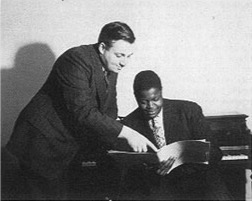













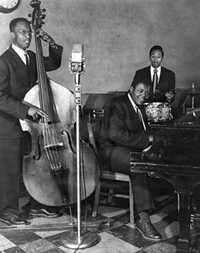







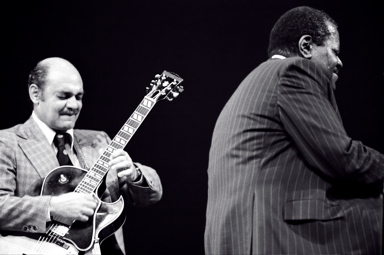




















































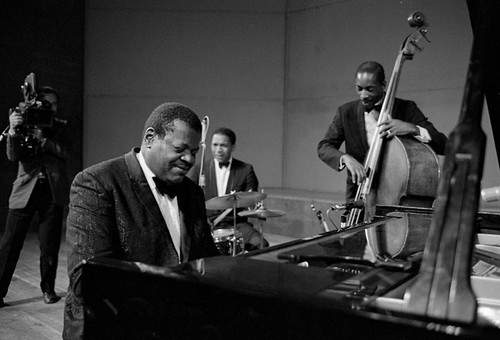








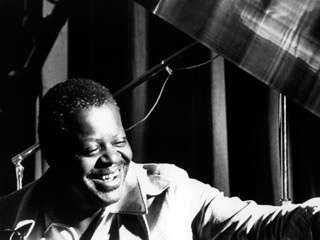
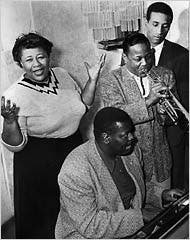
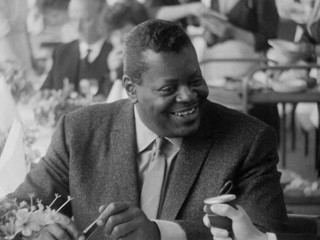









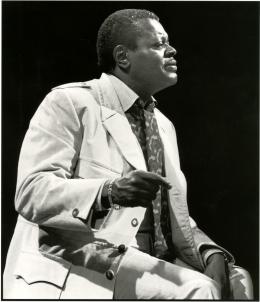





















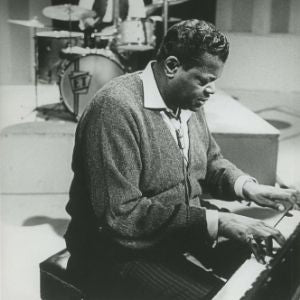







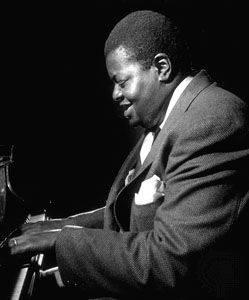













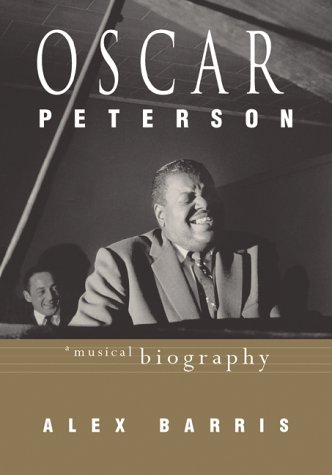



Comments